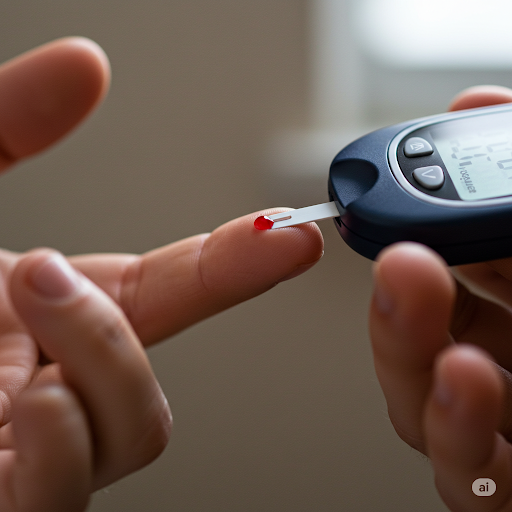Before giving 7 things to know when giving up sugar, nutritionists in India pointed out the harmful effects of consuming too much sugar.
Diabetes
"Excess sugar is stored as fat in the body and increases the risk of type 2 diabetes," says nutritionist Sifa Chishti (India).
In a study published in the journal Nutrients , a significant association was found between total sugar consumption and increased risk of diabetes.

There is a link between total sugar intake and the risk of diabetes
Photo: AI
Obesity
Consuming too much sugar can lead to weight gain by increasing calorie intake and decreasing feelings of fullness. A study published in the journal Children found that consuming a lot of added sugar increases the risk of children becoming overweight or obese.
Liver problems
Fructose is processed in the liver and excess sugar leads to increased triglyceride levels. They create high levels of bad cholesterol and lead to fat accumulation in the liver.
Inflammation
Long-term consumption of sugar leads to inflammation, oxidative stress, and autoimmune disorders. "Chronic systemic inflammation in the body can further increase the risk of cancer," Chishti added.
Tooth decay
High sugar intake feeds harmful bacteria in the mouth and causes tooth decay.
Intestinal disorders
Consuming too much sugar causes intestinal dysbiosis, which is an imbalance in the gut bacterial community. In this condition, beneficial bacteria decrease and harmful bacteria increase, leading to inflammation and gastrointestinal diseases.

Sugar withdrawal can also cause headaches.
Photo: AI
Limiting or giving up sugar can be a step towards a healthier body. But before you give up sugar, you need to know how your body will react so you don't get caught off guard, according to the health site Healthshots (USA).
Mood swings when quitting sugar
Giving up sugar can lead to a drop in feel-good hormones like dopamine and serotonin. “This can lead to mood swings and irritability in some people,” says Chishti. You can control these by engaging in regular physical activity, practicing mindfulness, and consuming foods that naturally support serotonin and dopamine production, like nuts, eggs, and dairy.
Sleep problems
Quitting sugar can disrupt your sleep because it can affect your cortisol or stress hormone levels. You can control this by avoiding too much screen time before bed, practicing an early bedtime routine, and going to bed at the same time every day.
Intestinal tract affected
Initially, you may experience bloating and indigestion due to the change in your gut flora, i.e. from harmful bacteria to beneficial gut bacteria. Eat fermented foods like yogurt or take probiotic supplements after consulting your doctor.
Craving sweets
Your body will not accept your decision to give up sugar easily. You may have strong cravings for sweets after meals. Giving up sugar may be your plan, but don't do it suddenly. Replace added sugars with natural sugars like fruit and honey.
Tired
Your energy levels will drop after you give up sugar, which is known to provide quick energy. To boost your energy levels, eat a healthy, balanced meal that includes good quality protein, fat, and fiber. This way, you won’t have to worry about low energy.
Headache
Headaches can have many causes. And quitting sugar can also cause headaches. This can happen right after quitting sugar because of the drop in dopamine levels. Stay hydrated and get enough sleep to reduce stress.
Weight changes
Your weight may fluctuate after giving up sugar. Since high sugar intake is linked to obesity or being overweight, cutting back on sugar may lead to weight loss. Make sure to eat balanced meals with plenty of fiber in your diet.
Source: https://thanhnien.vn/7-dieu-can-biet-truoc-khi-cai-duong-185250502213629114.htm





































































































Comment (0)